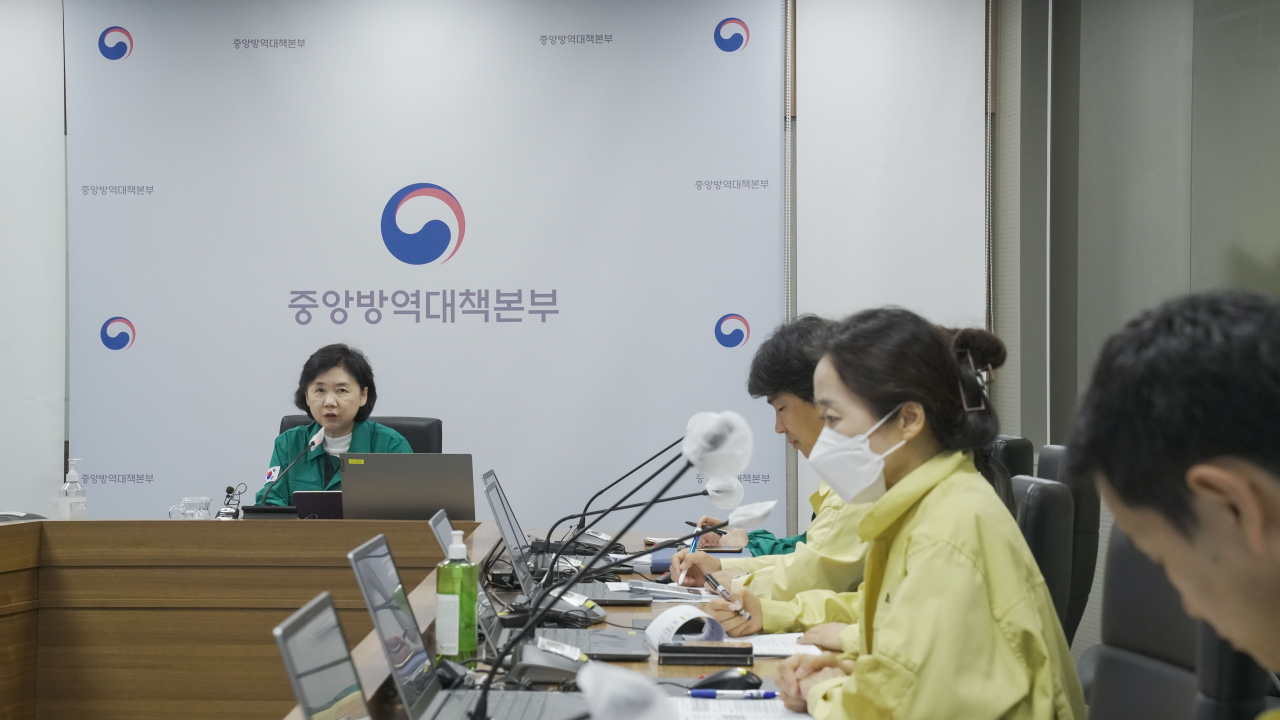 |
Jee Young-mee (left), head of the Korea Disease Control and Prevention Agency, speaks during a plenary session of the Central Disease Control Headquarters on Wednesday. (The Korea Disease Control and Prevention Agency) |
Korea will reclassify COVID-19 to the same category as the seasonal flu starting Aug. 31, health authorities said Wednesday.
COVID-19 will go down from class 2 to class 4, the lowest infectious disease category which comprises diseases such as the seasonal flu, hand-foot-and-mouth disease, gonorrhoea and syphilis, that the government considers manageable with stability.
The decision was based on the declining number of infections and stabilization of the quarantine situation. The daily average of new COVID-19 infections for the week of Aug. 13-19 was 41,698, marking a 16.4 percent decrease from the previous week's 49,893.
“The number of COVID-19 confirmed cases, which had increased since the fourth week of June, has recently turned to a decline, and the overall quarantine situation has been stabilized," Jee Young-mee, commissioner of the Korea Disease Control and Prevention Agency, said during a meeting of the Central Disease Control Headquarters.
"For healthy people, the risk of COVID-19 has been reduced to the level of flu. Based on this judgment, the government has decided to downgrade the infection level of COVID-19.”
COVID-19 was classified as a class 1 disease following the outbreak in 2020 and was adjusted to class 2 last year. Under a class 2 designation, the infection level of COVID-19 was on par with tuberculosis, chickenpox, measles, cholera or typhoid fever. Class 2 infectious diseases should be reported to the government within 24 hours of occurrence, but there is no such obligation for level 4 diseases.
Korea has removed most COVID-19 restrictions, except for the mask-wearing mandate at vulnerable facilities such as hospitals or medical institutions that treat inpatients or residential medical facilities with groups vulnerable to infectious diseases.
There is no mask mandate for class 4 respiratory infectious diseases, but the KDCA has decided to maintain the requirement for mask-wearing at vulnerable places for the time being.
“The decision on whether to lift the mask requirement at vulnerable places will be made later considering the trend of the virus's spread,” the KDCA said in a statement.
Subsidies such as financial aid and paid vacation expenses to low-income patients will be axed. After the reclassification, support for COVID-19 hospitalization costs will only be covered for some people, such as severely ill patients.
The KDCA stressed that it would continue to provide free vaccinations for everyone and free medicine to the elderly.
A total of 561 COVID-19 screening test centers nationwide at public health centers will continue to operate for the time being, although it is not legally necessary for a class 4 disease, in light of the surge in infections over the past few weeks before it stabilized recently. The closure of these centers will be decided later, according to the KDCA.
Also, the government will discontinue the daily tally of confirmed COVID-19 cases, which has been in place since the pandemic outbreak.
The disease control agency said it would continue to monitor the COVID-19 epidemic and mutant virus patterns, including wastewater surveillance. Wastewater surveillance can provide an early warning of COVID-19’s spread in communities, the KDCA said.
In October, Korea will roll out COVID-19 vaccinations in preparation for a resurgence on the back of the winter virus wave. Those aged 65 or older or those with reduced immunity are recommended to be vaccinated, the KDCA noted.
“Please continue to make efforts to prevent various infectious diseases, including COVID-19, by washing hands frequently and ventilating regularly,” Jee said.







